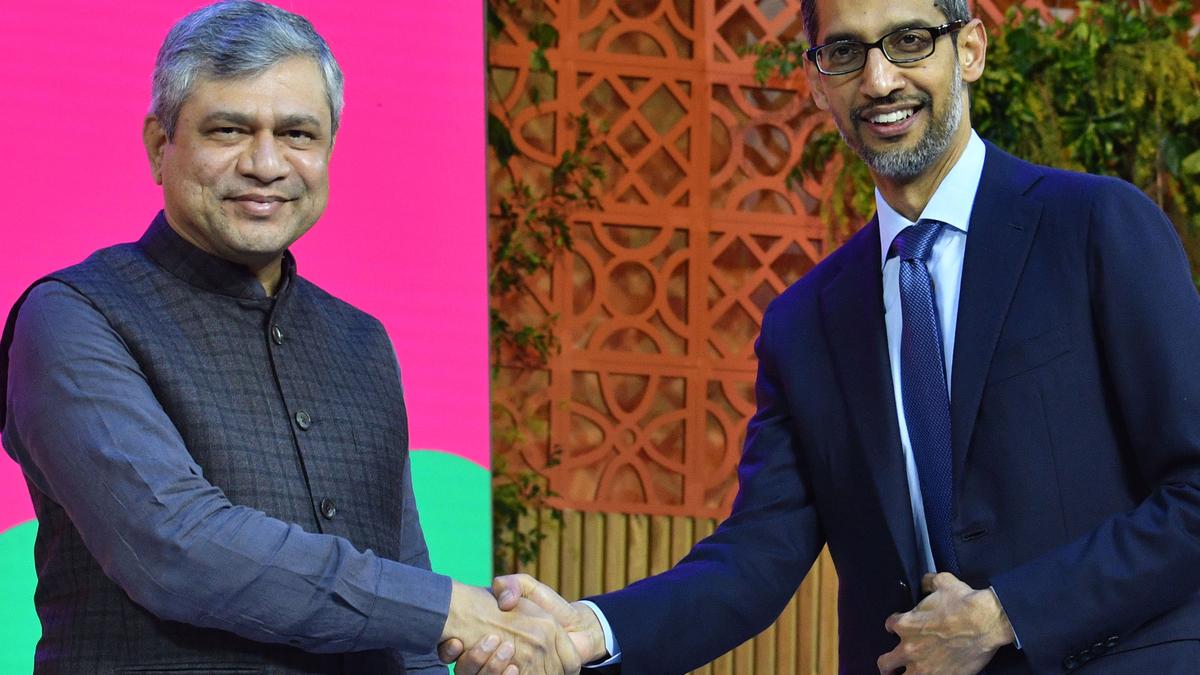FILE PHOTO: Google also argued that the DOJ is unfairly targeting it in a highly competitive space (Union Minister for Electronics & Information Technology, Ashwini Vaishnaw & Google CEO Sundar Pichai)
| Photo Credit: THB
As Google rolls out a sweeping expansion of its artificial intelligence tools across search, advertising, and YouTube in India, its global ad and search business models are simultaneously under intense legal scrutiny in the U.S., raising questions about the balance between innovation and market power.
In India, Google is aggressively integrating generative AI into its advertising ecosystem to reshape how brands reach consumers. At a recent virtual media roundtable, the tech giant highlighted AI-driven advancements aimed at enhancing discovery and commerce. Google says its tools are helping advertisers achieve tangible results, with platforms like YouTube, especially on connected TVs (CTV), and Shorts becoming key to capturing consumer attention in one of the world’s fastest-growing digital markets.
For instance, YouTube now gets over 1 billion hours of global watch time daily, with India contributing significantly. The country’s growing preference for CTV over linear TV is pushing advertisers to adopt newer formats. Some ad campaigns on CTV are also seeing nearly 3.6x conversion rate increase. Meanwhile, YouTube Shorts is gaining traction among younger users, with 72% of Indian respondents saying Shorts ads influence their purchase decisions, Google shared during the roundtable.
Beyond video, Google Search is undergoing a transformation, too. AI Overviews powered by Gemini, Circle to Search, and Google Lens, which now handles nearly 20 billion monthly queries, are enabling more predictive and visually-driven search experiences. Google claimed that businesses are seeing results as some brands are reporting higher return on investment from their campaigns. The search giant shared that quick commerce company Zepto reduced content creation time significantly with AI-powered video tools.
Yet while these innovations promise growth for India’s digital economy, Google faces mounting pressure in the U.S. over how it has wielded its dominance in the online advertising sector.
Multiple blows
U.S. District Judge Leonie Brinkema, on April 17, ruled that Google illegally dominated two markets in the ad tech and noted that the search giant was liable for “willfully acquiring and maintaining monopoly power” in the advertising technology business by being the middleman between buyers and sellers of ad content.
In the trial that began last August, the second one that Google lost in less than two years, the Department of Justice (DOJ) alleged that Google illegally monopolised the digital ads market through its suite of tools, including those developed by DoubleClick, a company it acquired in 2008 for $3.1 billion.
At the time of acquisition, DoubleClick was a leader in display ad serving and had a vast network of advertisers and publishers. Integrating DoubleClick’s technology allowed Google to enhance its ad targeting and analytics capabilities, solidifying its position in the digital advertising market.
Google rebranded DoubleClick’s products under the Google Marketing Platform, including tools like Display & Video 360 and Campaign Manager 360. These platforms have become integral to Google’s advertising ecosystem, serving a significant portion of global digital ad transactions.
In the antitrust case, the DOJ claims Google’s ad stack, which is used for auctions and transactions, controls 87% of the U.S. market and has stifled competition, inflated costs for advertisers, and squeezed revenue for publishers.
The stakes are high. While this ad tech case represents a smaller portion of Google’s revenue compared to its core search business, the ruling by Judge Brinkema could reshape the landscape of digital advertising by breaking up Google’s ad business, including the forced divestiture of its DoubleClick assets.

This ruling leads to another hearing to discuss remedies, including selling off the ad exchange unit and on how Google can restore competition in the ad tech market. Google, for its part, has said it will be appeal the ruling, noting that, “Publishers have many options and they choose Google because our ad tech tools are simple, affordable and effective.”
Another case looms
During the trial, Google also argued that the DOJ is unfairly targeting it in a highly competitive space. The company contends that it has built the most effective system through innovation, not coercion, and that the government is ignoring the broader ad ecosystem, which includes rising competition from platforms like Meta, Amazon, and TikTok.
Meanwhile, in markets like India, Google’s AI bets are gaining traction with businesses testing AI tools for cost efficiency and growth. But even as the company positions itself as a partner in digital transformation abroad, its practices back home remain a legal battleground.
Judge Brinkema’s ruling comes at a time when another historic antitrust trial that is currently underway this week. The DOJ is prosecuting Google’s online search monopoly through its Chrome browser. The government is also attempting to prevent the search giant from utilizing its AI products in online search, such as AI Overviews. If the court rules in favor of the DOJ in this trial, Google will be compelled to fundamentally reconsider its AI plans.
Published – April 25, 2025 08:00 am IST
